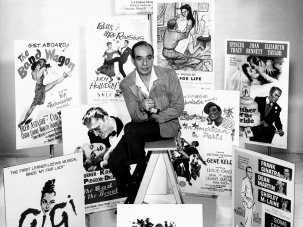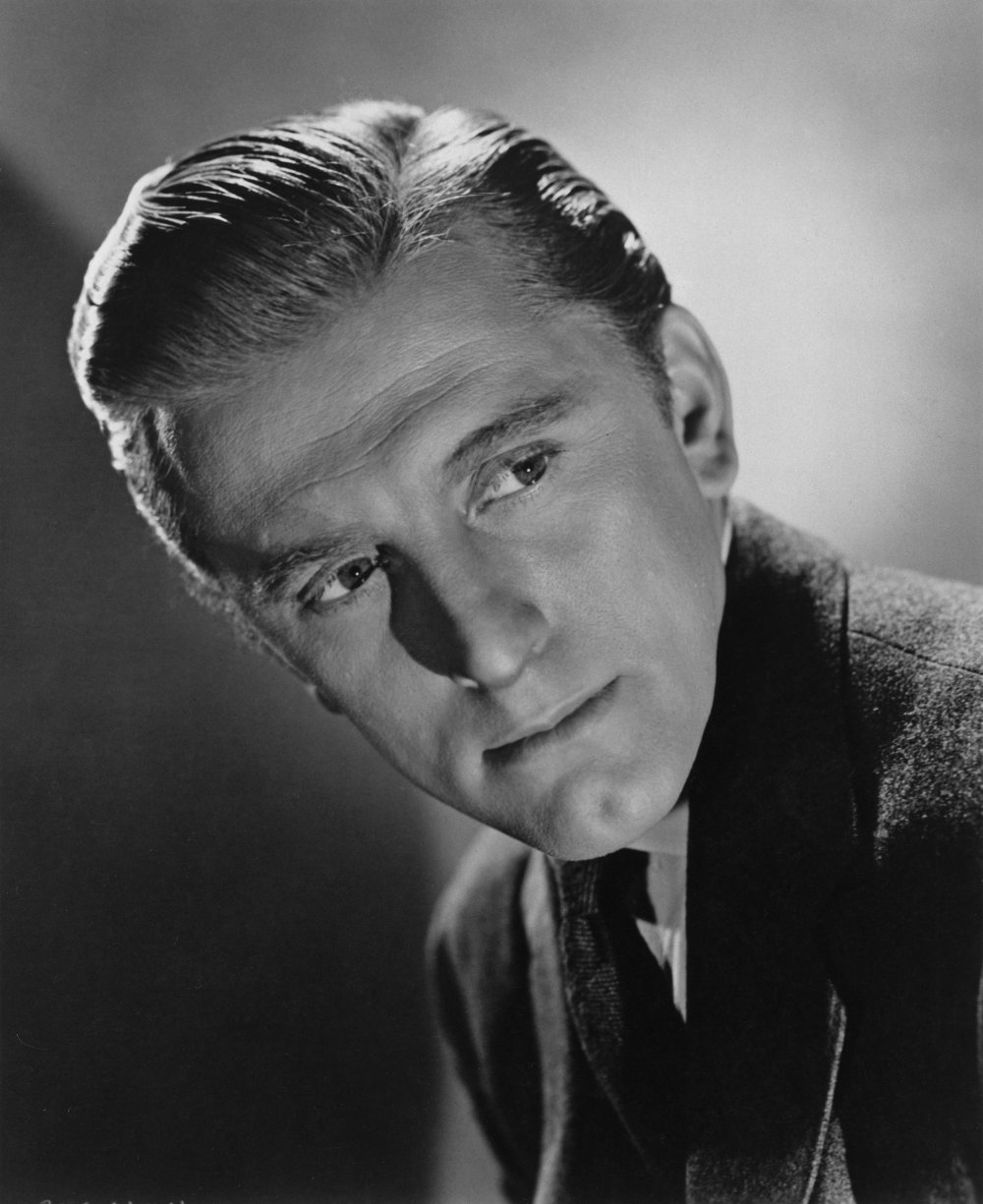
Centenarian Kirk Douglas, a legendary name in film history and the last of the great male stars of Hollywood’s golden age, has died aged 103. An actor with a singularly intense, often ferocious, presence on screen, his portrayals of damaged masculinity and misanthropic heroism – in Champion, Ace in the Hole, The Bad and the Beautiful, Lust for Life, Paths of Glory – were counted among the most ambitious and acclaimed performances in the postwar cinema. A man manifestly driven by his own lust for living, he sustained an acting career lasting more than 60 years, in theatre, radio, motion pictures and television, saw action in World War II, ran a pioneering production company, wrote a dozen published works (from acclaimed memoirs to fiction to children’s stories), roamed the world as a goodwill ambassador for his country, defied Hollywood’s Red Scare blacklist and virtually defeated a life-threatening stroke at the age of 79.
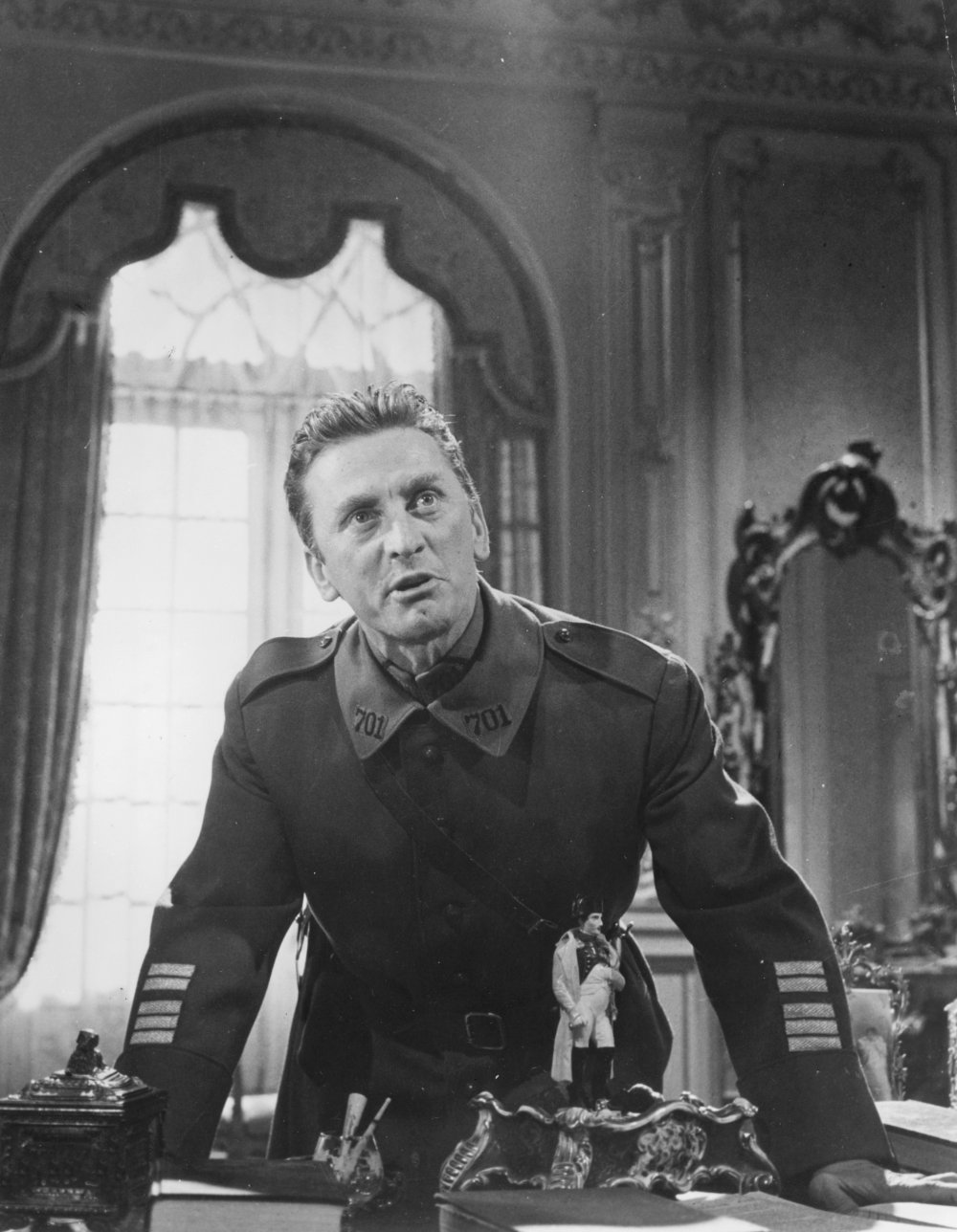
Paths of Glory (1957)
Born Issur Danielovitch in Amsterdam, New York, a small upstate city along the Mohawk River, he was the son of Jewish immigrants from the Mogilev region of the Russian Empire (now Belarus), the only boy among six siblings. The family spoke Yiddish in the home, and their life in America showed little improvement on the dire conditions the parents had left behind in Russia. Douglas would remember a childhood of near destitution, a large family barely surviving on the pennies and nickels his father made as a ‘ragman’ peddling pieces of junk in the street from a horse-drawn cart.
The desperate beginnings formed his character – strong-willed, compassionate, contentious, selfish. The lasting psychic stain of his father’s degradation and his own abject childhood was evident in the title he would choose for his 1988 autobiography: The Ragman’s Son.
In high-school plays he discovered his talent for acting. On a scholarship he studied at the American Academy of Dramatic Arts in New York City (where his classmate was a sultry teenager named Betty Joan Perske, later known as Lauren Bacall). When America entered the war he enlisted in the Navy, served for two years and returned home with honors. In New York he met and married a beautiful actress (Diana Dill), fathered two children (Michael and Joel), and worked on the stage and in radio, journeyman on-the-job training in a hundred parts small and large.
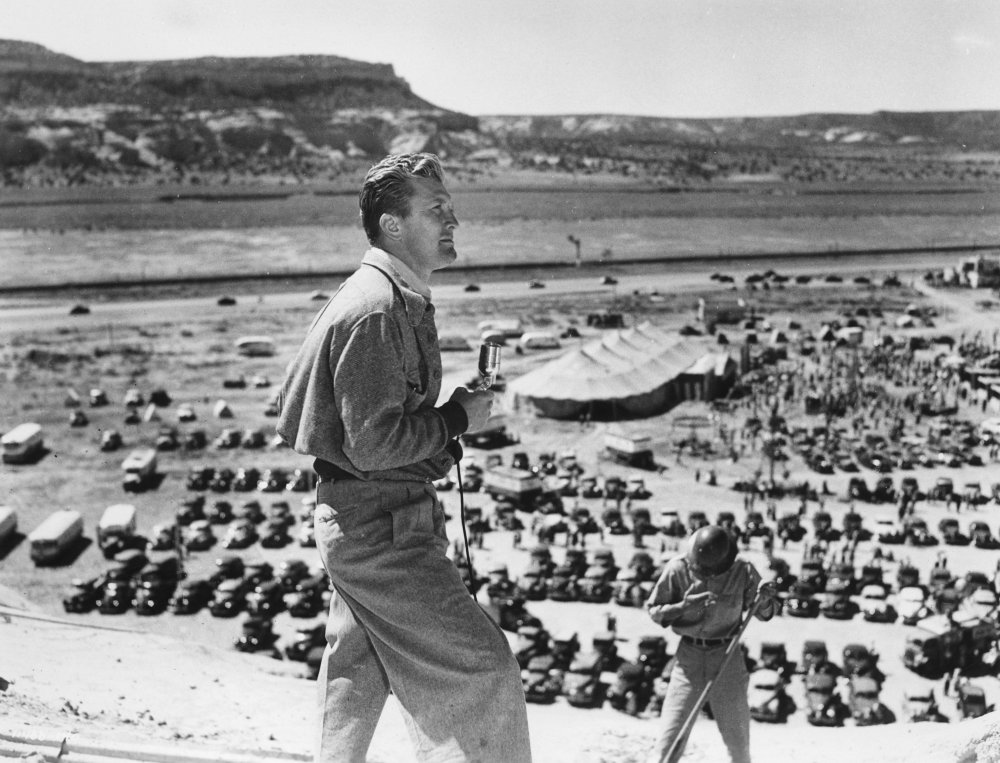
Ace in the Hole (1951)
In 1945 came the call from Hollywood (recommended by new Warner Bros star Lauren Bacall), an audition for producer Hal Wallis, a part: Walter O’Neill, the district attorney husband of Barbara Stanwyck in The Strange Love of Martha Ivers (1946). The film was lurid noir melodrama, a flambé of lust, corruption, bad memories and murder. Douglas, up against seasoned movie stars, makes a remarkable debut, his whipped DA a compelling mix of charm, hostility and self-loathing. The nominal romantic leads, Van Heflin and Lizabeth Scott, pale beside the film’s mad couple, Stanwyck and the newcomer Douglas, who concludes the marriage and the plot with a still-startling murder-suicide (and how in the world did they get that Code-breaker past the 1946 censors?).
Good parts followed, not leads but strong supporting roles in good and great films, most notably the character of Whit, the cosmopolitan villain in Out of the Past (1947). On camera, toe to toe with Robert Mitchum, dimpled chin to dimpled chin, the two legendarily feuded for screen space with a series of upstaging tactics, until director Jacques Tourneur called a stop to the nonsense. A mesmerising matchup, but Mitchum was then the bigger star and he gets to die in flames with the ravishing Jane Greer while Kirk, with less clout, expires off camera, his death scene snipped from the final cut in favour of a brief glimpse of his corpse.
He played another smooth operator in I Walk Alone (1947), a throwback gangster picture that had him matching wits with and again playing support to another powerful presence, Burt Lancaster. It would be the first of seven pairings with Lancaster between 1948 and 1986, a diverse group of films that included a George Bernard Shaw adaptation (The Devil’s Disciple, 1959), a political thriller (Seven Days in May, 1963), a western (Gunfight at the O.K. Corral, 1956) and a nostalgic comedy (Tough Guys, 1986). Lancaster would demand top billing for all seven (Burt took no prisoners, professionally speaking, and the two actors were not particularly compatible in real life), but more than once Kirk would steal the picture from him.
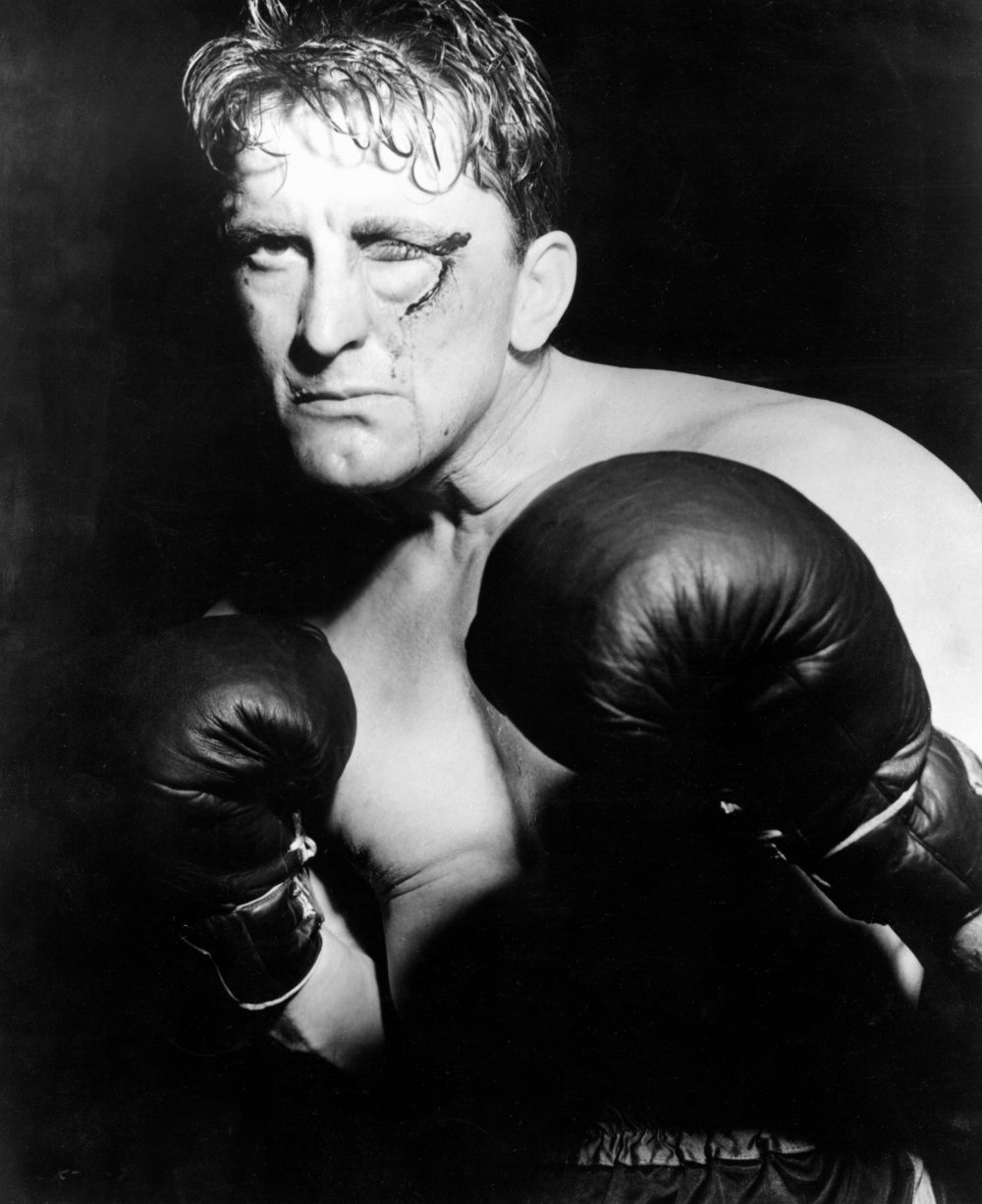
Champion (1949)
Brilliant in A Letter to Three Wives (1949) as the witty, exasperated college professor George Phipps, another super-eloquent surrogate for writer-director Joe Mankiewicz, Douglas feared that the part indicated the way Hollywood was inclined to see him – intellectual, neurotic… weak. MGM offered him the lead in The Great Sinner, a plush costume picture out of Dostoyevsky. The part: a self-destructive writer, intellectual, neurotic. Weak. It meant big money and MGM stardom, but Douglas turned it down, opting instead for a low-paying independent production that held the role he knew instinctively he’d been waiting for. In Champion (1949), as the arrogant, emotionally and physically brutal boxer Midge Kelly, Douglas for the first time exploded on the screen, a performance of raging masculinity comparable to Brando’s Stanley Kowalski.
Champion gave him stardom and a lasting screen persona: edgy, dynamic, sexually magnetic. It was the character template he would follow with few exceptions for the next two decades, refining and expanding it through a series of extraordinary performances, achieving critical acclaim and box office supremacy.
In Billy Wilder’s Ace in the Hole (1951), a prescient fable of mass media-induced delirium, he played ruthless Chuck Tatum, former whizz-kid newspaperman reduced to a job in the sticks, hungry for a return to power, staking it on the cynical exploitation of a man trapped in a crumbled cave. Douglas’s dazzlingly deceitful Tatum is a bottomless ditch of loathing, self-loathing, soulless ambition. Cautious belt-and-suspenders audiences of the early 50s were repelled, Wilder’s cynicism held to blame, but it was Douglas’s electrifying display of antiheroism, leering nihilism, that may have been a bridge too far even for Wilder’s corrosive worldview. So disliked on release that the studio tried disguising it with an alternate title, then buried it, the film now ranks among the director’s greatest.
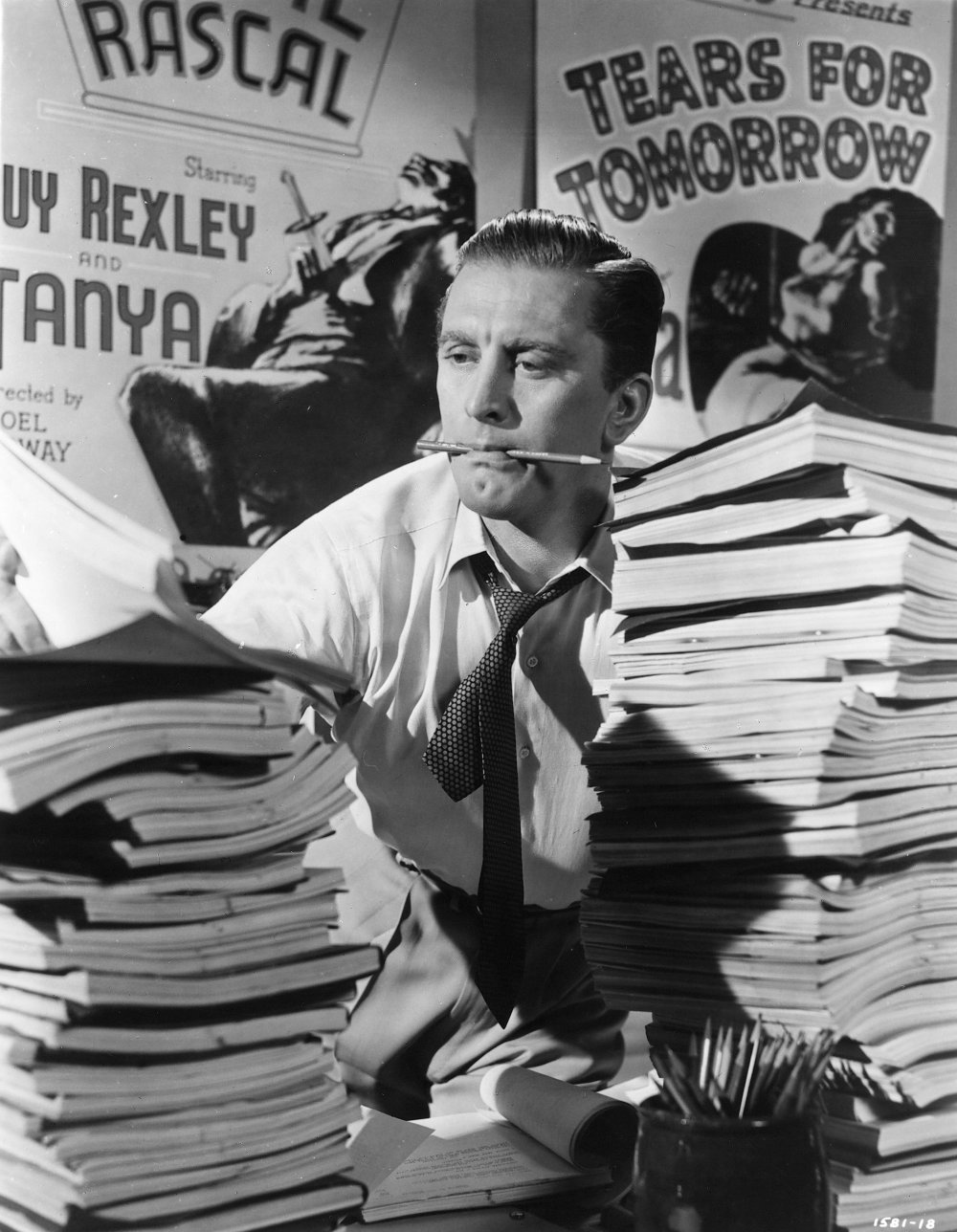
The Bad and the Beautiful (1952)
What Douglas did for journalists in Ace in the Hole, he then did for Hollywood’s ruling class in The Bad and the Beautiful (1952), playing ruthless moviemaker Jonathan Shields with an honesty that the more forgiving movie itself tried to avoid.
He returned to work with director Vincente Minnelli in what would be his most acclaimed and likely greatest ever performance as Vincent van Gogh in Lust for Life (1956), an agonised and at times agonising portrait in depth of creative genius and madness. A nearly equal accomplishment, often overlooked, was his portrayal of doomed gunslinger Doc Holliday (to Burt Lancaster’s Wyatt Earp) in Gunfight at the O.K. Corral, certainly one of the strongest and most ‘adult’ characterisations in the great era of ‘adult westerns’.
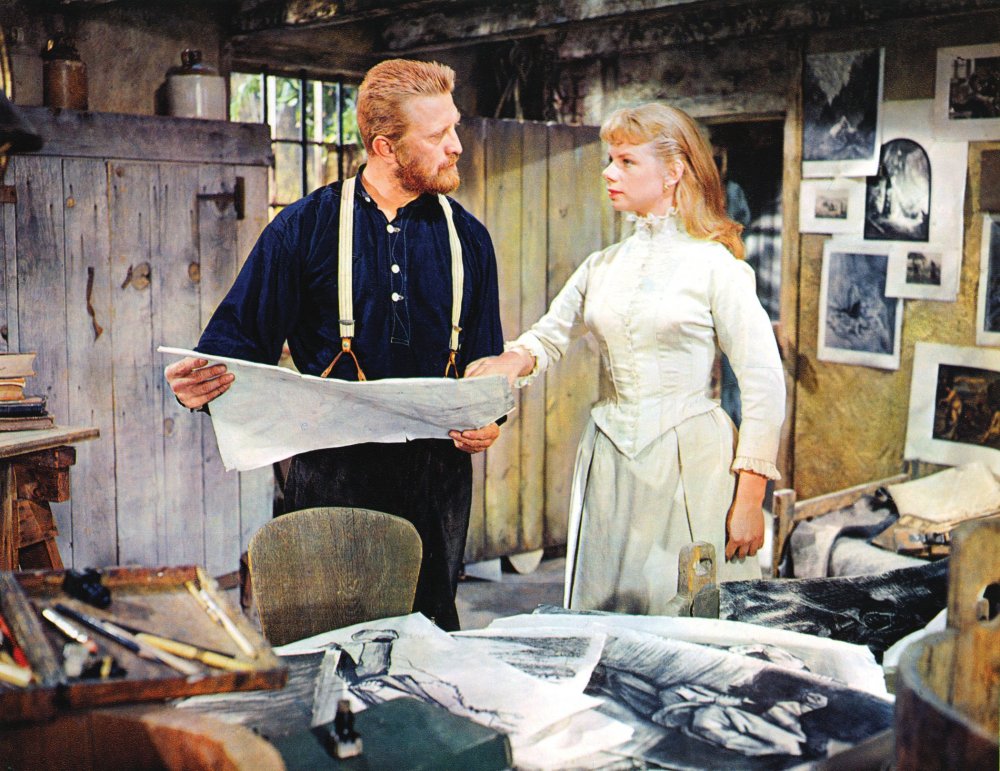
Lust for Life (1956)
In the mid-50s Douglas became one of the handful of major stars who chose to guide their cinematic destiny with their own production company. Bryna Productions – named for his mother – would be responsible for 16 films, including Paths of Glory (1957), the World War I antiwar drama directed by Stanley Kubrick; The Vikings (1958), filmed with vigour on spectacular European locations by director Richard Fleischer; and the sword-and-sandal epic Spartacus (1960), a second and final collaboration with Kubrick.
Douglas was for much of his life a political activist (Democratic), philanthropist and spokesman for human and civil-rights issues. For the production of Spartacus, he favoured the open hiring and on-screen crediting of blacklisted screenwriter Dalton Trumbo. Though Otto Preminger’s hiring of Trumbo for Exodus came earlier, Spartacus was released first, and while some have questioned the chronology of events and the degree of Douglas’s influence, he could undoubtedly take credit as one of the first and most prominent Hollywood producers to ‘break the blacklist’.
Though his position as a box-office draw began to fade by the mid-1960s, Douglas continued to work steadily in leading parts into the 90s, remaining a vigorous presence on screen, even, in the 1980 film Saturn 3 co-starring Farrah Fawcett, performing a creditable nude scene at the age of 64.
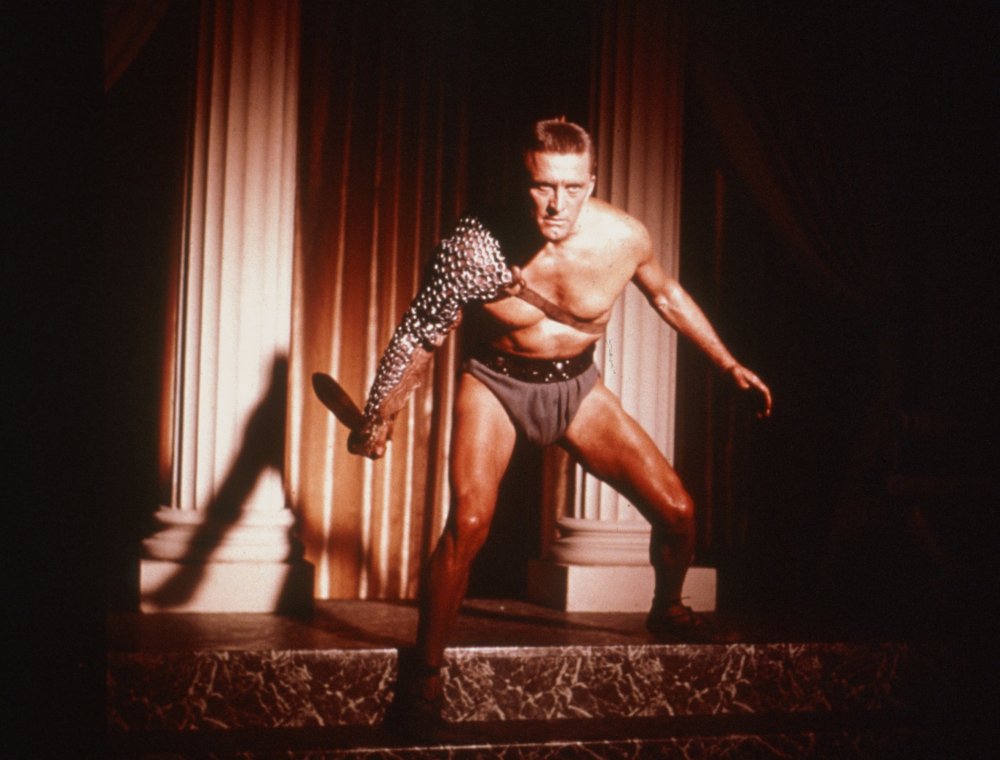
Spartacus (1960)
In 1991 he sustained serious injuries but survived a helicopter crash that killed some of the other passengers. Douglas had a stroke in 1996, giving him partial paralysis and making him unable to form words. Determination and years of therapy gave him back much of his speaking ability, and despite the continued evidence of the stroke in his speech he was able to work again, in films, on television and on the stage.
In 2003 he appeared with his son Michael Douglas and assorted other family members in It Runs in the Family, produced by Michael and his brother Joel. He made his final starring appearance in his one-man stage show Before I Forget at the Kirk Douglas Theatre in Culver City. In his later years he had greatly renewed interest in his spiritual beliefs and in the religion of his birth. Married to his wife Anne Buydens Douglas since 1954, he celebrated their 65th wedding anniversary in 2019.
Our video showcase Kirk Douglas – Hollywood champ, made to celebrate his centenary and screened at his birthday party
-
The 100 Greatest Films of All Time 2012
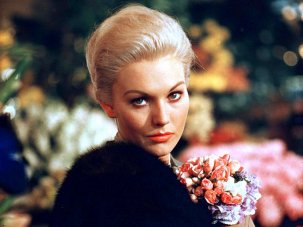
In our biggest ever film critics’ poll, the list of best movies ever made has a new top film, ending the 50-year reign of Citizen Kane.
Wednesday 1 August 2012
-
The Digital Edition and Archive quick link
Log in here to your digital edition and archive subscription, take a look at the packages on offer and buy a subscription.





